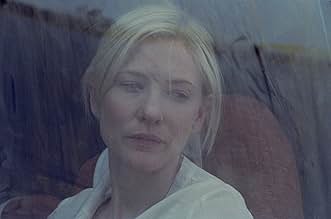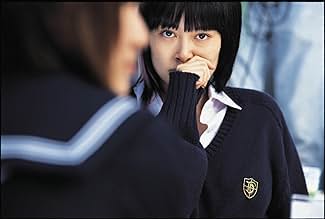La tragedia sorprende a un pareja cuando está de vacaciones en el desierto marroquí, dando comienzo a una historia entrelazada que afecta a cuatro familias diferentes.La tragedia sorprende a un pareja cuando está de vacaciones en el desierto marroquí, dando comienzo a una historia entrelazada que afecta a cuatro familias diferentes.La tragedia sorprende a un pareja cuando está de vacaciones en el desierto marroquí, dando comienzo a una historia entrelazada que afecta a cuatro familias diferentes.
- Dirección
- Guionistas
- Elenco
- Ganó 1 premio Óscar
- 45 premios ganados y 137 nominaciones en total
Opiniones destacadas
4 tenuously connected stories, beautifully shot, admirable soundtrack, and competent acting and directing. But, psychologically, philosophically, sociologically meaningful? Perhaps in their individual stories? But as a whole, I for one cannot connect the dots in this one.
Different people, different races, socio economic classes, cultures, countries, oh, and of course languages, hence communication. A lot of them making really stupid decisions, one in each tale, giving rise to tension and drama in each. Rich or poor, east or west, weak or strong, everyone is prone to just doing the wrong things at times.
It was a decent watch, even given the over bloated running time. If it affected you? Then you have understood the directors language I guess.
Different people, different races, socio economic classes, cultures, countries, oh, and of course languages, hence communication. A lot of them making really stupid decisions, one in each tale, giving rise to tension and drama in each. Rich or poor, east or west, weak or strong, everyone is prone to just doing the wrong things at times.
It was a decent watch, even given the over bloated running time. If it affected you? Then you have understood the directors language I guess.
Alejandro González Iñárritu's two previous films, Amores Perros and 21 Grams, dealt with the subject of very different people being connected on a small scale. Babel takes a different approach, but has the same central theme. The plot follows four different stories that stretch the entire globe (Morocco, Japan, Mexico and a few minutes in America) and shows how one single bullet can effect the lives of people so far apart. Guillermo Arriaga's script is breathtaking and perfectly structures this vast array of characters. Within minutes of being with them, we know exactly who they are and what drives their current personality. This gives time for the epic story to play out.
It's all centered around two young boys who are fooling around with a rifle and accidentally shoot American tourist Susan (Cate Blanchett) who is on "vacation" with her husband Richard (Brad Pitt). Though never directly saying it, it's quite clear that one of their son's died and Richard panicked and left his family behind; leaving Susan to care for their two remaining children. He came back and their vacation to Morocco was really just an excuse for them to get away and try to get their marriage back together. Ultimately it does bring them back to each other, but it takes tragedy to do so. Brad Pitt's performance is one of the finest of 2006 and his internal pain and emotional strength manage to bring a river of tears flowing from my eyes. It's his best performance since Twelve Monkeys and further proves that through all of the controversy of his social life, he's still a phenomenal actor. Back in America, their nanny Amelia (Adriana Barraza) is taking care of their two children while they are gone. Through unfortunate circumstances she has to bring them to Mexico for her son's wedding and things take a huge turn for the worse when they try to cross back over into America.The final story is a much further departure from the rest of the characters. It centers around a deaf-mute Japanese schoolgirl named Chieko (Rinko Kikuchi) who struggles with the pain of being so different from everyone else along with her mother's apparent suicide and the police's attempt at questioning her father about a gun he gave to a Moroccan man (the gun used to shoot Susan).
While most people believe that the film is about how people living so close to each other can be so different, I actually feel that it's the exact opposite. I think it's a story of how people so far apart (on different continents, speaking different languages) are almost exactly alike. All of the stories center around similar themes; loneliness, alienation, depression, the loss of a loved one and more while Arriaga never forgets to subtly mention the political outrage that comes from an American woman being shot in a foreign country. Every character feels the same emotions, deals with similar pain and are all connected by this single shooting. Babel starts off as a film about very different people in very different worlds, but ends up being one studying human nature and showing that even when we're worlds apart people we can still be so similar. All you have to do is listen.
It's all centered around two young boys who are fooling around with a rifle and accidentally shoot American tourist Susan (Cate Blanchett) who is on "vacation" with her husband Richard (Brad Pitt). Though never directly saying it, it's quite clear that one of their son's died and Richard panicked and left his family behind; leaving Susan to care for their two remaining children. He came back and their vacation to Morocco was really just an excuse for them to get away and try to get their marriage back together. Ultimately it does bring them back to each other, but it takes tragedy to do so. Brad Pitt's performance is one of the finest of 2006 and his internal pain and emotional strength manage to bring a river of tears flowing from my eyes. It's his best performance since Twelve Monkeys and further proves that through all of the controversy of his social life, he's still a phenomenal actor. Back in America, their nanny Amelia (Adriana Barraza) is taking care of their two children while they are gone. Through unfortunate circumstances she has to bring them to Mexico for her son's wedding and things take a huge turn for the worse when they try to cross back over into America.The final story is a much further departure from the rest of the characters. It centers around a deaf-mute Japanese schoolgirl named Chieko (Rinko Kikuchi) who struggles with the pain of being so different from everyone else along with her mother's apparent suicide and the police's attempt at questioning her father about a gun he gave to a Moroccan man (the gun used to shoot Susan).
While most people believe that the film is about how people living so close to each other can be so different, I actually feel that it's the exact opposite. I think it's a story of how people so far apart (on different continents, speaking different languages) are almost exactly alike. All of the stories center around similar themes; loneliness, alienation, depression, the loss of a loved one and more while Arriaga never forgets to subtly mention the political outrage that comes from an American woman being shot in a foreign country. Every character feels the same emotions, deals with similar pain and are all connected by this single shooting. Babel starts off as a film about very different people in very different worlds, but ends up being one studying human nature and showing that even when we're worlds apart people we can still be so similar. All you have to do is listen.
Alejandro Gonzalez Inarritu's Babel weaves four disparate and seemingly unrelated tales into a distinct, gritty narrative about the importance of communication - and what can happen when it goes awry. The movie is oftentimes difficult to watch, with ultrarealistic cinematography and gutsy, honest performances from its entire cast, particularly Oscar-nominated actresses Adriana Barraza (Amelia) and Rinko Kikuchi (Chieko).
Told nonlinearly, the movie describes the travails of a troubled married couple with a tour group in Morocco, played by Brad Pitt and Cate Blanchett. Something in their past has driven them apart, and to help deal with the problem they have taken a trip together. Meanwhile, the sons of a shepherd fight over who's the better shot with their new rifle and fire a blast at the couple's tour bus, critically wounding Susan (Blanchett).
Richard (Pitt) calls home in San Diego to notify the nanny of their children, Amelia; Amelia is in a bit of a bind, because she expected the parents home so she could attend the wedding of her son in Mexico. With Richard and Susan not returning soon, and with no one else available to watch the children, she takes them with her to the wedding.
In Japan, a deaf-mute Japanese girl acts out in reaction to her mother's suicide, which she discovered; the virginal Chieko becomes a huge sexual flirt, even removing her panties in a crowded restaurant to flash older boys. Chieko craves human contact but feels that the world's even more shut off to her now than ever before, and she sullenly shuns even her father's attentions.
It should go without saying that this film really isn't for everyone. It's gut-wrenchingly tough to watch at times, especially when Susan's wound is being treated. You can readily imagine how it'd be if you, an unworldly American, were suddenly in dire need of expert medical attention in a part of the world that wasn't really famed for it. That's enough to strike terror in me already, and I haven't even mentioned how Richard and Susan are awaiting help to arrive in a small, impoverished village with no running water or electricity - and only one person who can speak English to them.
How exactly these stories are commingled becomes evident as the movie progresses, but it's not all elegantly laid out for the viewer to immediately grasp; this is accomplished in part by the nonlinear storytelling. We see a scene near the end of the movie that is a mirror image of one from the beginning, except told from a different character's perspective. That's a tribute to the wonderful camera-work and editing by, respectively, Rodrigo Prieto and the team of Douglas Crise and Stephen Mirrone.
Barraza turns in a powerful, heart-breaking performance; at one point, she's stranded in the middle of the Sonoran desert with her two young charges clad in her dress from the wedding. Dazed by the blistering heat, Amelia cannot gain her bearings in the blazing heat, and she despairs. Then she makes a critical decision with devastating consequences.
Kikuchi is absolutely mesmerizing as the silent Chieko. Without uttering one word, she's able to convey a vast array of emotions, from loneliness to hostility to love to lust to affection. She's alternately serene and violent, in charge of and captured by her impediment. Chieko resents her father, her volleyball teammates, and most of all every so-called normal person who looks at deaf-mutes as monsters, creatures to be scorned and taken advantage of. Like Barraza, Kikuchi's role called for a difficult sacrifice: plenty of nudity.
Babel is a spellbinding, multifaceted story with towering, passionate performances by all of the leads. It's full of moxie and stark realism, and despite some minor plot implausibilities, it's a true feather in the cap for Inarritu.
Told nonlinearly, the movie describes the travails of a troubled married couple with a tour group in Morocco, played by Brad Pitt and Cate Blanchett. Something in their past has driven them apart, and to help deal with the problem they have taken a trip together. Meanwhile, the sons of a shepherd fight over who's the better shot with their new rifle and fire a blast at the couple's tour bus, critically wounding Susan (Blanchett).
Richard (Pitt) calls home in San Diego to notify the nanny of their children, Amelia; Amelia is in a bit of a bind, because she expected the parents home so she could attend the wedding of her son in Mexico. With Richard and Susan not returning soon, and with no one else available to watch the children, she takes them with her to the wedding.
In Japan, a deaf-mute Japanese girl acts out in reaction to her mother's suicide, which she discovered; the virginal Chieko becomes a huge sexual flirt, even removing her panties in a crowded restaurant to flash older boys. Chieko craves human contact but feels that the world's even more shut off to her now than ever before, and she sullenly shuns even her father's attentions.
It should go without saying that this film really isn't for everyone. It's gut-wrenchingly tough to watch at times, especially when Susan's wound is being treated. You can readily imagine how it'd be if you, an unworldly American, were suddenly in dire need of expert medical attention in a part of the world that wasn't really famed for it. That's enough to strike terror in me already, and I haven't even mentioned how Richard and Susan are awaiting help to arrive in a small, impoverished village with no running water or electricity - and only one person who can speak English to them.
How exactly these stories are commingled becomes evident as the movie progresses, but it's not all elegantly laid out for the viewer to immediately grasp; this is accomplished in part by the nonlinear storytelling. We see a scene near the end of the movie that is a mirror image of one from the beginning, except told from a different character's perspective. That's a tribute to the wonderful camera-work and editing by, respectively, Rodrigo Prieto and the team of Douglas Crise and Stephen Mirrone.
Barraza turns in a powerful, heart-breaking performance; at one point, she's stranded in the middle of the Sonoran desert with her two young charges clad in her dress from the wedding. Dazed by the blistering heat, Amelia cannot gain her bearings in the blazing heat, and she despairs. Then she makes a critical decision with devastating consequences.
Kikuchi is absolutely mesmerizing as the silent Chieko. Without uttering one word, she's able to convey a vast array of emotions, from loneliness to hostility to love to lust to affection. She's alternately serene and violent, in charge of and captured by her impediment. Chieko resents her father, her volleyball teammates, and most of all every so-called normal person who looks at deaf-mutes as monsters, creatures to be scorned and taken advantage of. Like Barraza, Kikuchi's role called for a difficult sacrifice: plenty of nudity.
Babel is a spellbinding, multifaceted story with towering, passionate performances by all of the leads. It's full of moxie and stark realism, and despite some minor plot implausibilities, it's a true feather in the cap for Inarritu.
I'm generally not a fan of non-linear storytelling in films - there is usually no reason for it and it can be frustrating and difficult to follow the plot. While the plot in 'Babel' is relatively easy to follow, the film still suffers the same annoying problems as other non-linear films.
The most irritating thing for me is how scenes that are connected and happening at the same time are presented so far apart. At the very start of the film we see kids fire a bullet at a coach, yet the scene that logically goes together with this from inside the coach does come until a significant while later.
The viewer also never gets to properly know any of the characters - there's no time for any character development as the film is constantly going back and forth between characters and situations. As a result, you don't really care for what happens to any of them.
The saving grace of 'Babel' is its ending, which brings everything together and wraps the story up nicely. Even though it can be a frustrating watch at times, 'Babel' is a smart and well-made film.
The most irritating thing for me is how scenes that are connected and happening at the same time are presented so far apart. At the very start of the film we see kids fire a bullet at a coach, yet the scene that logically goes together with this from inside the coach does come until a significant while later.
The viewer also never gets to properly know any of the characters - there's no time for any character development as the film is constantly going back and forth between characters and situations. As a result, you don't really care for what happens to any of them.
The saving grace of 'Babel' is its ending, which brings everything together and wraps the story up nicely. Even though it can be a frustrating watch at times, 'Babel' is a smart and well-made film.
Alejandro González Iñárritu's direction is brilliantly layered and intricately woven. He deftly uses different film stock, imagery, sound, and stories to weave a single tale out of four disparate ones, a talent he's shown in other films.
The story by screenwriter Guillermo Arriaga and Iñárritu has one incident ricochet around the globe, and peeling back the layers of culture to show the frustrating inability to communicate, and the poignancy and universality of familial love.
Each story is complete, but a series of snapshots that leave as many questions as answers. As the stories unfold, the backstories and the futures of the characters are chock full of possibility and pain. As one commenter during the Q&A said, it was frustratingly beautiful. Each storyline deals with family and conflict from the inability to communicate or to understand.
All the performances are incredible, and very touching. Brad Pitt did an excellent job, and the always outstanding Cate Blanchett, a powerhouse actor if there ever was one, has the least screen time of any of the leads. Few can do so much with so little. But the really outstanding performance is Rinko Kikuchi as a deaf-mute Tokyo teen.
To say any more would possibly lesson the experience, so let me just say this: it may seem confusing at times, but by the end, it will seem like poetry.
The story by screenwriter Guillermo Arriaga and Iñárritu has one incident ricochet around the globe, and peeling back the layers of culture to show the frustrating inability to communicate, and the poignancy and universality of familial love.
Each story is complete, but a series of snapshots that leave as many questions as answers. As the stories unfold, the backstories and the futures of the characters are chock full of possibility and pain. As one commenter during the Q&A said, it was frustratingly beautiful. Each storyline deals with family and conflict from the inability to communicate or to understand.
All the performances are incredible, and very touching. Brad Pitt did an excellent job, and the always outstanding Cate Blanchett, a powerhouse actor if there ever was one, has the least screen time of any of the leads. Few can do so much with so little. But the really outstanding performance is Rinko Kikuchi as a deaf-mute Tokyo teen.
To say any more would possibly lesson the experience, so let me just say this: it may seem confusing at times, but by the end, it will seem like poetry.
¿Sabías que…?
- TriviaThe scene where Chieko (Rinko Kikuchi) and her father are in the car together was shot without filming permission from the city due to slow Japanese bureaucratic procedures. The crew created "man-made" busy traffic, and began shooting the scene. Later the police started chasing them while still shooting the scene.
- ErroresAfter the wedding, Amelia, her nephew and the Jones children use the Tecate border crossing to reenter the USA. After fleeing, we are shown a sandy, wide desert where they wander. Actually, the Tecate border crossing is in the mountains, there is no such desert within a reasonable distance on the USA side. What is shown looks like an Arizona border crossing.
- Citas
Mike Jones: My mom said Mexico is dangerous.
Santiago: [in Spanish] Yes, it's full of Mexicans.
- Bandas sonorasPara Que Regreses
El Chapo
Gabriel Ramirez
Maximo Aguirre Music Publishing, Inc.
D Disa Latin Music, S. de R.L. de C.V
Selecciones populares
Inicia sesión para calificar y agrega a la lista de videos para obtener recomendaciones personalizadas
Detalles
- Fecha de lanzamiento
- Países de origen
- Idiomas
- También se conoce como
- Tháp Babel
- Locaciones de filmación
- Productoras
- Ver más créditos de la compañía en IMDbPro
Taquilla
- Presupuesto
- USD 25,000,000 (estimado)
- Total en EE. UU. y Canadá
- USD 34,302,837
- Fin de semana de estreno en EE. UU. y Canadá
- USD 389,351
- 29 oct 2006
- Total a nivel mundial
- USD 135,330,835
- Tiempo de ejecución2 horas 23 minutos
- Color
- Mezcla de sonido
- Relación de aspecto
- 1.85 : 1
Contribuir a esta página
Sugiere una edición o agrega el contenido que falta


































